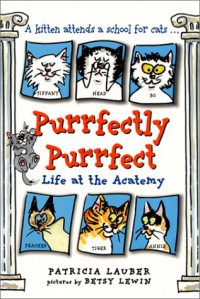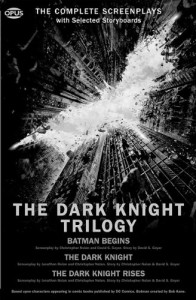6
Followers
6
Following
The Review Man
Formerly of Goodreads, now of both words, in the coming times only here?
Currently reading
Survival: A Thematic Guide to Canadian Literature
Lila: An Inquiry Into Morals
Simulacra and Simulation (The Body, In Theory: Histories of Cultural Materialism)
Leaven of Malice
The Salterton Trilogy
Effi Briest (Penguin Classics)
Empires of the Word: A Language History of the World
Cases And Materials On The Law Of Torts
Public Law : Cases Materials and Commentary
A Property Law Reader
 This book's plot is so—unintentionally—hilariously contrived and the writing so cringe-inducing that I had no choice but to enjoy it.
This book's plot is so—unintentionally—hilariously contrived and the writing so cringe-inducing that I had no choice but to enjoy it.I read an ARC I found at my bookstore.
 Mildly entertaining tale of a boy who is hit by a meteorite, becomes something of a celebrity and then hangs out with an old dude. Reads like a Kurt Vonnegut fan fiction.
Mildly entertaining tale of a boy who is hit by a meteorite, becomes something of a celebrity and then hangs out with an old dude. Reads like a Kurt Vonnegut fan fiction.We all need mindless entertainment now and again. (I watched four seasons of Greek when I was younger, so I don't own exclusive rights to snobbery!) This might be that book for you, particularly if you like Vonnegut.
 Math is not geeky. Math is awesome. And why are the math equations on the front cover absolutely nonsensical? Whoever designed this cover ought to have done some research. About ten seconds' worth would have sufficed.
Math is not geeky. Math is awesome. And why are the math equations on the front cover absolutely nonsensical? Whoever designed this cover ought to have done some research. About ten seconds' worth would have sufficed.
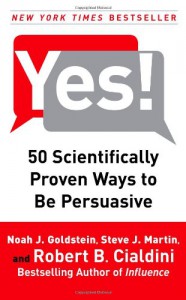 Statistics!
Statistics!Are you scared yet? Many people are. In fact, statistics have a pretty mixed reputation in popular culture. They're commonly portrayed as a) incredibly boring, b) incredibly confusing, or c) incredibly useful. All three depictions are truthful in a way but also a bit off. Yes, sifting through millions of lines of "data" can be boring, but it's incredible that we can reach useful and interesting conclusions from a mass of "boring" data. Next, statistics can be confusing—but perhaps only to those people who have given up on math in the first place. Statistics make sense and are grounded in reality too: we use similar devices every day (albeit in a less generalized way than would a statistician). Finally, while statistics are useful, thousands of pages of raw numbers are pointless if we can't arrive at a few numbers or facts that accurately summarize the entire data set. I would go so far as to claim that raw data is meaningless without an intelligent mind to sort it.
So statistics are relevant, but maybe only when used correctly. And that's the problem with Yes!. This is a great book full of interesting ideas on persuasion. Readers discover why asking for a small favour may brighten their prospects, why they ought to use certain words and turns of phrase when writing persuasive copy, and why sticky notes are actually quite useful, among other things. I've put into practice more than a few of the ideas found in Yes! and they've been successful thus far.
Each chapter, focused on one persuasive idea, is supported by a study, usually one conducted by the book's authors. The studies reveal interesting statistics which are used to bolster the authors' particular point about persuasion. But I'm a little wary of jumping on the statistics train here. Firstly, there is typically only one study mentioned per chapter. Studies are fine, but we're not told the sample size of the studies or how often they were repeated. This isn't an issue of lack of trust; I'm sure the authors are truthfully reporting the results of their studies, but one wonders how meaningful a statistical result is when the particulars of the study itself are vague. Are the book's results then really "scientifically proven"? It's hard to say whether they are or whether this is just another "easy answers" project in the style of Malcolm Gladwell.
I don't necessarily trust studies. You can probably find studies that prove anything you want to posit (and even some contradictory points too), so ceteris paribus, how much more compelling does one study make your argument? It's no small irony that I remain unconvinced by the authors' statistics about persuasion! I'm a little uncomfortable with accepting a premise simply because one study was conducted. Doesn't necessarily make the conclusion false, but it means I'd be wary of blindly taking it as truth.
Now maybe this is a non-issue for most (certainly for those who find statistics boring in the first place), but I couldn't help but bring it up. And I must stress that the book's results are interesting and probably incredibly useful. I just wish that the statistics emphasis had been a little more concrete.
At most 3 stars; probably 2.5 or fewer.
The Rag: Winter 2012
 A few weeks ago I was sent a message on Goodreads by a Dan Reilly, who encouraged me to read a magazine he was promoting. I figured I'd try the free issue hosted on their website. I promised a fair review, although that's not saying a whole lot since all of my reviews are fair, but most of them are under three stars. Maybe I'm just a sucker for punishment.
A few weeks ago I was sent a message on Goodreads by a Dan Reilly, who encouraged me to read a magazine he was promoting. I figured I'd try the free issue hosted on their website. I promised a fair review, although that's not saying a whole lot since all of my reviews are fair, but most of them are under three stars. Maybe I'm just a sucker for punishment.The magazine is called The Rag, which doesn't inspire much confidence and made me wonder whether it was Vagina Monologues-themed. Turns out I was half right: there are no vaginas (apart from one cringe-inducing mention of a "fleshy seat"—seriously, what is this?), but there's lots of fucking. (By that I mean the writers have a curious predilection for the f-word. You'll be hard pressed to find a piece without that word. I generally find cursing distasteful, but so be it.) It's never easy to kickstart a publication, especially one that'll probably appeal to a very limited audience, so I do applaud the editors' efforts in that respect.
The Rag collects gritty, ironic short stories about uncomfortable things. "Transgressive fiction", it's called. It's not hard to figure out why. Most of the contributing authors seem like the sort of people who rebelled against the mainstream and joined a hipster/punk collective in high school, then rebelled against that in their early twenties. Their characters are simultaneously Anti-Everything and anti-Anti-Everything, if that's even possible. As such, there's quite a lot of suburbia-indicting and blasé existentialism going on. One story is littered with brand names ("We eat a lot of chicken thighs fried in I Can’t Believe It’s Not Butter!"). Another deals with a space traveller who arrives on one of Jupiter's moons while high on antidepressants and uncovers some sort of ghastly genocide, although we'll never know how or why it happened or whether it was important. (Today's writers, not content with merely "not telling", have apparently decided to "not show" either.)
The worst of the bunch is a piece called "D–Gen". (The author must've been too cool to spell out the word degenerate.) The main character, a broke, alcohol-chugging, sex-starved security guard/extortionist who spends all his earnings/stealings on poker, is so comically misanthropic that I burst out laughing while reading the story. By the time he pulled the fire alarm on a wedding party, I was beside myself. It's hard not to giggle at such po-faced self-seriousness.
What else might you expect if you flip through an issue of The Rag? You might find spelling and grammar errors:
All four girls are just standing there perched up on their toes in their little black heals [sic], pondering just what the fuck is going on.
But don't worry—that was written by someone who aims to "show how the traditional American Dream is more or less an unsustainable and equally ridiculous aspiration"! Would it be cruel to point out that this guy's writing career is also an unsustainable and equally ridiculous aspiration?
To be fair, I can't say whether this issue is representative of the magazine as a whole. Who knows—maybe the pieces have increased in quality as a function of time. And let's not dwell excessively on the negatives; there are two things that save this issue from utter hopelessness. The first is a decent piece called "You Take Care Now, Mary Jones". No f-words in this one, and while the characters are still soulless anti-consumerist mouthpieces, at least they're interesting mouthpieces. The second is a story named "The Leaves Are Falling" that takes a very brief look at life, marriage, pain and death. It's too short but it shows great promise. It's written by a mathematician too—I knew those guys were awesome.
2 stars.
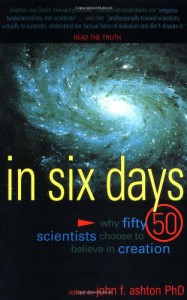 Mostly an uninspired retread of Michael J. Behe's Darwin's Black Box. Behe's is an interesting read (although it's all but discredited as pseudoscience now) and its central idea, irreducible complexity, could have been Intelligent Design's lynchpin in the post-millennial world had it not been squandered by overzealous and under-qualified scientists like those who write for In Six Days. As is stands here, you won't learn a whole lot.
Mostly an uninspired retread of Michael J. Behe's Darwin's Black Box. Behe's is an interesting read (although it's all but discredited as pseudoscience now) and its central idea, irreducible complexity, could have been Intelligent Design's lynchpin in the post-millennial world had it not been squandered by overzealous and under-qualified scientists like those who write for In Six Days. As is stands here, you won't learn a whole lot.I've heard from various sources that some of In Six Days' arguments regarding thermodynamics and entropy are plain kooky. I've never studied physics so I couldn't say for sure, but I'm inclined to agree with the critics on that one. As I understand it, global entropy is a non-decreasing function, but local entropy can decrease for a time. If my understanding is correct, that blows a sizeable hole in many of the arguments put forth by the scientists behind In Six Days.
Equally troubling is the fact that many of these scientists are not strictly scientists—biologists, chemists, physicists et al.—rather, they are doctors or engineers or other such professionals. This is in no way a slight against those important professions, but one wonders whether an engineer is qualified to speak on such a topic as evolution or even irreducible complexity. It doesn't render void their arguments, but it is cause for concern. One must also wonder why said scientists "chose to believe in creation". Did they make that choice in spite of the mass of evidence in front of them? Does science even offer us such a choice? Difficult questions that In Six Days is not well-equipped to handle.
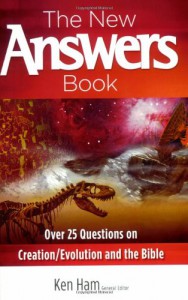 What a horrid book The Answers Book is. Ken Ham is a scientist (actually, he only has a bachelor's in applied science, so perhaps scientist is presumptuous) who believes the Earth was created six thousand years ago. Warning: that makes little sense to anyone who knows anything about cosmology. If the distant starlight theory were actually correct, then God would be pulling the wool over our eyes—essentially tricking us into thinking that the Earth is millions of years old. And to what end? Doesn't sound anything like God to me.
What a horrid book The Answers Book is. Ken Ham is a scientist (actually, he only has a bachelor's in applied science, so perhaps scientist is presumptuous) who believes the Earth was created six thousand years ago. Warning: that makes little sense to anyone who knows anything about cosmology. If the distant starlight theory were actually correct, then God would be pulling the wool over our eyes—essentially tricking us into thinking that the Earth is millions of years old. And to what end? Doesn't sound anything like God to me.This isn't a one-time thing: rather than use evidence to build a case for God, Ham and Co. repeatedly shoehorn God into any and every possible scientific "uncertainty" that's cropped up in the past fifty years. The God of the Gaps might make for interesting theology, but it's certainly not compelling science.
Sure, I have a few problems with evolution, but I don't write books about how it's BS propagated by those darn scientists to trick us into denouncing God or something. This is not a book that promises reasonable debate in that regard. Sure, I think there's a God out there somewhere, but I definitely don't believe that Planet Earth was created a couple thousand years ago or that evolution is a bucket of lies, and I think that The Answers Book is doing God (if he exists) a huge disservice.
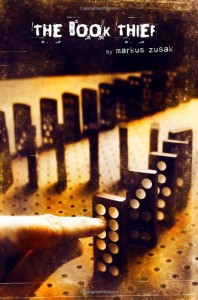 When Death shows up at the end of Woody Allen's fantastic 1975 comedy Love and Death, it's funny. For one thing, it follows a scene in which Allen rather brilliantly satirizes Bergman's Persona, as such slyly informing the viewer that his entrance is played for laughs. (Interestingly enough, death was an important theme—and sometimes a character too—in Bergman's films.) But more importantly, Woody Allen proves that he's not really taking himself seriously. There's something about the juxtaposition of eternal damnation and Woody Allen's bumbling, neurotic Boris that's inherently hilarious. (How I wish he would return to these heights instead of pumping out drivel like To Rome With Love... but that's another story.)
When Death shows up at the end of Woody Allen's fantastic 1975 comedy Love and Death, it's funny. For one thing, it follows a scene in which Allen rather brilliantly satirizes Bergman's Persona, as such slyly informing the viewer that his entrance is played for laughs. (Interestingly enough, death was an important theme—and sometimes a character too—in Bergman's films.) But more importantly, Woody Allen proves that he's not really taking himself seriously. There's something about the juxtaposition of eternal damnation and Woody Allen's bumbling, neurotic Boris that's inherently hilarious. (How I wish he would return to these heights instead of pumping out drivel like To Rome With Love... but that's another story.)Popular writer Marcus Zusak one-ups Woody Allen by having Death narrate the whole of his recent book The Book Thief. But Zusak's Death isn't played for laughs at all; in fact, he's a pretty sombre guy (if gender can be attributed to Death) who, for some inexplicable reason, really likes colours. The problem here is that everybody already knows that Death is scary. It's neither new nor noteworthy from a characterization perspective.
In Love and Death, Death acts as existential comic relief, which I contend is why his appearance is so successful. But Zusak will have none of that; no, he is in an oh-so-serious mood here. And there's nothing that screams Serious Fiction to hack writers more than a Holocaust Story, so take a guess how this book unfolds. Zusak's not content to stop there, though. Instead he manufactures a Shoah replete with assembly-line canned emotion for his own authorial benefit. What—is there a shortage of truthful World War II stories to mine? Is this where decades of drivel like Schindler's List have taken us? In 1955, Alain Resnais directed what I consider to be the quintessential work of art concerning the Holocaust, Night and Fog. Zusak's fiction does not deserve to sit on the same shelf as that masterwork.
The other issue with The Book Thief is the ending, which seems a little too similar to that of Gravity's Rainbow for my tastes. Perhaps it's homage or perhaps Zusak's never read that book or perhaps it's something else entirely, but at any rate it doesn't sit well with me.
Zusak's writing is weak, but I am hardly surprised, since the average modern author couldn't write a decent paragraph if you put a gun to their head. Ultimately, that is the highest praise that can be accorded Zusak: that he is merely average. He ought not to take solace in this statistic, however; "average" on Planet Earth has proven to be painfully mediocre.
I close with a quote from Love and Death:
And so I walk through the valley of the shadow of death. Actually, make that "I run through the valley of the shadow of death"—in order to get out of the valley of the shadow of death more quickly, you see.
Zusak doesn't run through the valley of the shadow of death; he lingers in it for 550 pages. Why should anyone be surprised that the result is so languorous?
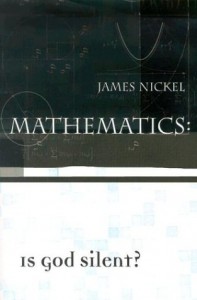 If you ever come across a newspaper headline or a book title with a question in it, the answer is almost always no.
If you ever come across a newspaper headline or a book title with a question in it, the answer is almost always no.This certainly applies to Mathematics: Is God Silent?. Well, that's what James Nickel wants you to believe. Throughout this book, Nickel tries to show that mathematics can be taught from a Biblical perspective. The real question I have about this book, however, is not whether God is silent; it's why teaching mathematics Biblically is worth discussing in the first place.
I think boredom may be the largest contributing factor to society's general dislike of mathematics. People don't like math, they think it's a series of dull calculations better suited for a computer, and they don't understand how and why math applies to the real world. This is a pedagogical problem with a catch: I don't see how adding God to the equation could possibly make people like math more.
Picture this: a prof is transcribing a Diophantine equation on the blackboard and droning on about Fermat or something. Then she says "... and this is just another example of God's beautiful creation." The problem? The aside doesn't really have anything to do with mathematics. Sure, that statement might ring true if you believe in a God, but it's still an editorialized, amathematical statement. God might be a mathematician, and the Holy Trinity might be best visualized using Cantor's set theory (that part of the book was pretty cool), but that doesn't mean that we ought to litter elementary math textbooks with references to the stuff.
I just can't see how this would work in an environment not completely saturated by religion. It certainly wouldn't fly in a public school; that's for sure. Nickel's ideas are thus restricted to home-schooling or religious classroom scenarios. An interesting idea perhaps, but not one I'd double down on.
Is throwing God in the mix the best way to get children excited about mathematics? I don't think so, but to be fair I can't come up with a better idea off the top of my head. Something worth thinking about.
 My skill in mathematics pales in comparison to Hardy's, but here goes anyway.
My skill in mathematics pales in comparison to Hardy's, but here goes anyway.Essentially, pure mathematics is more 'important' (if such a thing can be said) than applied mathematics, because the research conducted in the latter depends on the former. For example, cryptographers would not have a job were it not for the pure mathematicians who discovered the basis of the field in the 1970s. However, Hardy's comments about the utility of mathematics are outdated due to the importance of number theory in the modern landscape (cryptography, the Internet, etc.). It is lamentable that he did not live to see the fruition of his work in that domain, but the fact remains that pure mathematics has become very real and important to today's world. Goodreads would almost surely not exist were it not for this research.
I was quite puzzled to see Hardy label Pythagoras' theorem concerning the irrationality of the square root of 2 more 'deep' than Euclid's proof of the infinitude of the primes. This is a curious choice on Hardy's part, as I would wager that Hardy dealt with primes far more often than with irrationals. That is of course speculation on my part, but it does lead the reader to question how one seminal proof can be more 'deep' than another. It is also curious to read Hardy's thoughts on the importance of mathematics as it relates to other domains like the arts. He states, for example, that poetry is more important than cricket, but fails to justify this assertion in any meaningfully rigorous way. One might have expected more formality from a pure mathematician.
A Mathematician's Apology is worth reading in order to better understand the mind of a mathematician, although I might take some parts with a grain of salt.
An Introduction to Ordinary Differential Equations
 Dover publishes a lot of cheap math books. Is it then coincidental that many of them are also of poor quality? Coddington's book is no exception. It's bone-dry and boring to boot.
Dover publishes a lot of cheap math books. Is it then coincidental that many of them are also of poor quality? Coddington's book is no exception. It's bone-dry and boring to boot.I've often wondered why I've never come across an interesting differential equations textbook. Maybe the problem is me.
A Classical Introduction to Modern Number Theory
 I have a very close personal connection to this number theory textbook. My thesis supervisor studied under Kenneth Ireland in the early 1990s, before the latter's untimely passing. The other day, as I met with my supervisor, he pulled out his copy of A Classical Introduction to Modern Number Theory and showed me the front cover: signed by Ireland himself. It turns out that Ireland gave his copy of the textbook to my supervisor as a gift some twenty years ago. It felt more than a little strange to leaf through it that afternoon.
I have a very close personal connection to this number theory textbook. My thesis supervisor studied under Kenneth Ireland in the early 1990s, before the latter's untimely passing. The other day, as I met with my supervisor, he pulled out his copy of A Classical Introduction to Modern Number Theory and showed me the front cover: signed by Ireland himself. It turns out that Ireland gave his copy of the textbook to my supervisor as a gift some twenty years ago. It felt more than a little strange to leaf through it that afternoon.This is a great number theory textbook. Time and time again have I returned to the sections on Gauss and Jacobi sums. What a joy it is to live in a world where such beautiful math exists and where it is so expertly explained by authors like Rosen and Ireland. Although it is too late to meet Kenneth Ireland himself, his work in number theory will live on through this wonderful textbook.
 Only Marcus Buckingham (author of such hits as First, Break all the Rules) could have written something like this. Well, maybe not only him, but he certainly brings the unique Buckingham Touch™ in this latest outing.
Only Marcus Buckingham (author of such hits as First, Break all the Rules) could have written something like this. Well, maybe not only him, but he certainly brings the unique Buckingham Touch™ in this latest outing.What are the world's happiest women doing differently? (Differently than whom, one might ask.) What are the world's most successful women doing differently? Apparently, they're being more happy and more successful than other women. So if you want to be happy and successful like them, you should be more happy and successful. Like them.
At this point you may very well be cursing Marcus Buckingham's name and screaming "But how?" to the heavens. Turns out the answer's very simple: (and yet it took 263 pages for Mr. Buckingham to explain... ) do things you're good at, because they make you happier and more successful. Just think how unhappy and unsuccessful women would be without these wise words. On the other hand, I was much happier before I picked this book up. Maybe the truth ain't that simple, Marcus.
I'm hoping his next book is entitled Con Man: How to Sell Large Quantities of Your Non-Fiction Motivational Book to Unsuspecting Strangers. Now there's something that would make me happier and more successful.
 A few spoilers ahead.
A few spoilers ahead.Carpenter's Gothic is about many things: Africa, the apocalypse, rabid fundamentalism, deceit and trickery and fraud. But it seems to me that Gothic primarily treats entropy. Gaddis himself said in a rare interview (the link to which I have regrettably lost) that Pynchon did not particularly influence him, but it seems nonetheless that they were on the same scientific wavelength. Pynchon's Gravity's Rainbow uses Tyrone Slothrop as a kind of metonymy for World War II, and so as the war winds down and the insanity bubbles over, Slothrop's character becomes progressively more difficult to pin down. In Carpenter's Gothic, we experience a different sort of entropy; one not so much twinged with despair so much as drowned in a bucket of it. We watch as fundamentalists pillage America and then travel unto darkest Africa to repeat the entire process. This decay is cleverly characterized by Paul's increasingly insane behaviour, by the insinuation that McCandless was once confined to a mental institution, by the fact that even Elizabeth, arguably the most "normal" of the group, cannot escape this fate.
Gaddis' thesis seems to imply that thermodynamics trump theology, but the thematic richness doesn't stop there. Paul seems awfully like a caricature of a fundamentalist (although I'm willing to be proven wrong on that point), but Gaddis doesn't just take aim at Christianity—Billy's countercultural lifestyle is equally vapid. Even McCandless' supposed rationality doesn't suffice; it is a strangely defeated shell of a man who asks Elizabeth to leave with him at the novel's conclusion. This darkly satiric play (for it truly is closer to a play than any novel I've read) reminds us that the universe is marching toward catastrophe and that humanity is only speeding the process along. God is dead. Entropy is God. Long live entropy.












